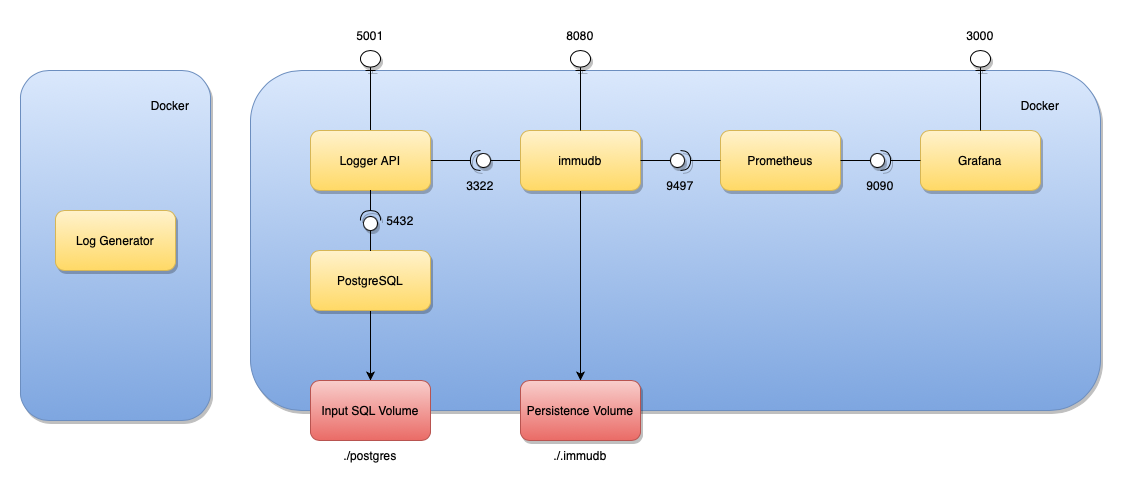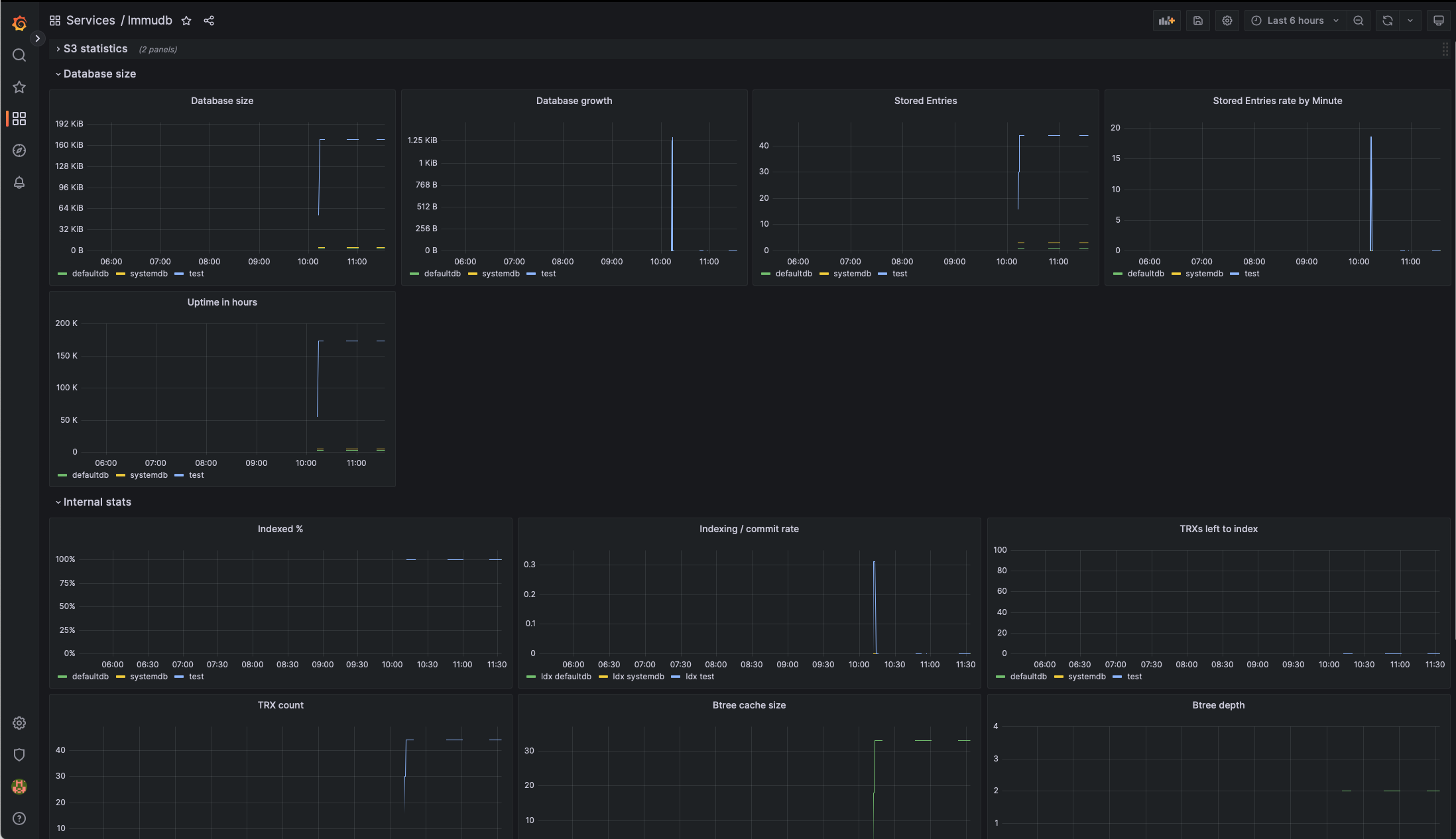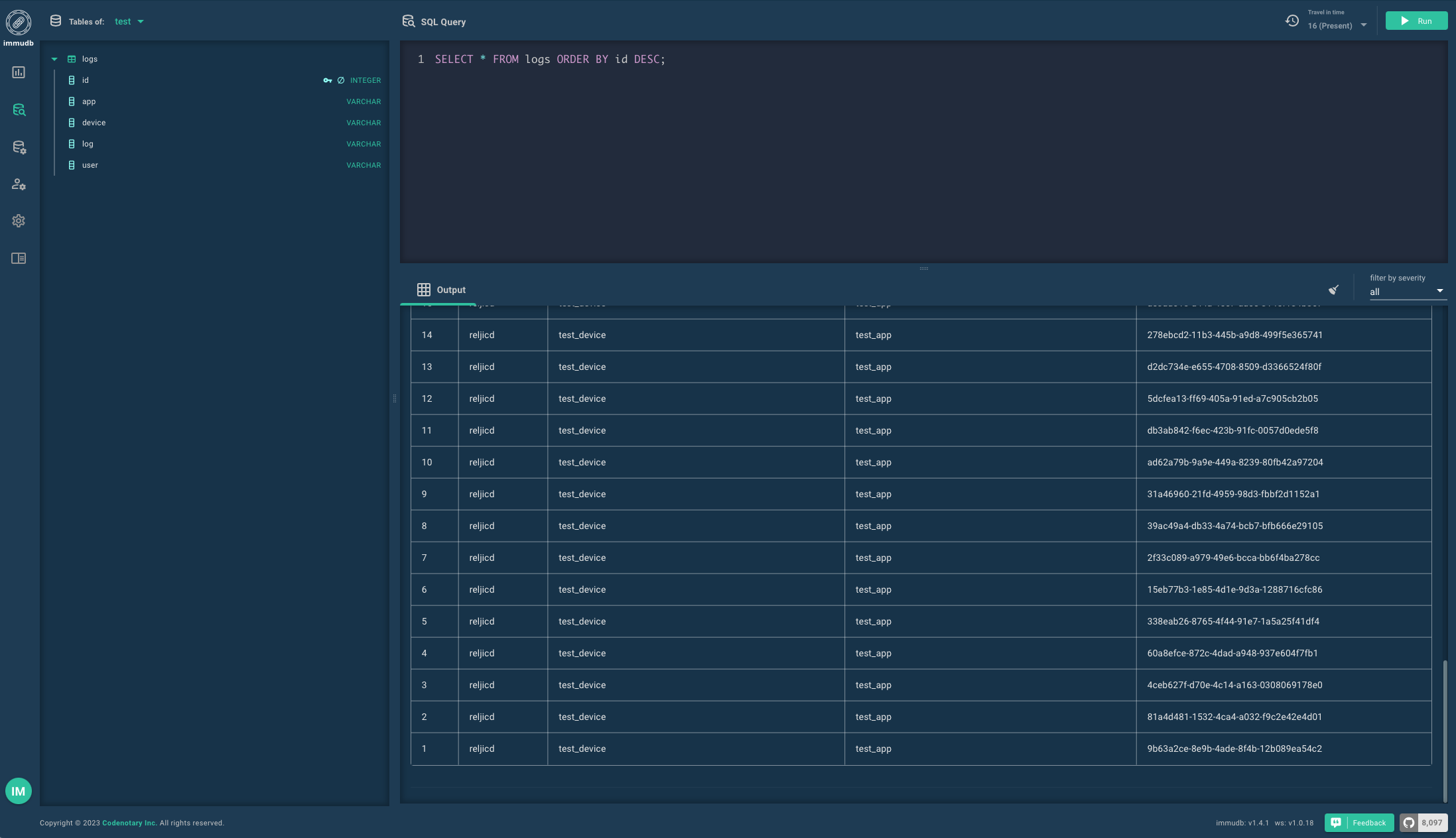- logger_api/app - Logger API implemented using flask. Depends on postgres and immudb
- logger_api/tests - Tests for Logger API. Depends on postgres and immudb
- grafana - Grafana configuration. Depends on prometheus.
- prometheus - Prometheus configuration. Depends on immudb.
- postgres - Import scripts for postgreSQL
docker-compose build
docker-compose upRun tests only after running previous docker compose up command to have all the dependencies started.
docker-compose -f docker-compose.yml run --rm --entrypoint "python -m pytest tests" logger_apiThe Logger API uses API keys to authenticate requests.
You can view and manage demo API keys before running the stack in users.csv, or by adding new users with their API keys directly in PostgreSQL while stack is up.
You can pass the API key in each requests using the request header api-key.
-H "api-key: ef229daa-d058-4dd4-9c93-24761842aec5"Demo API key: ef229daa-d058-4dd4-9c93-24761842aec5
- Description: Store batch of log lines
- Method: POST
- Content Type: application/json
- URL Structure:
http://localhost:5001/logs - Parameters:
- app:String - log source app
- device:String - log source device
- logs:List[String] - logs
- Example:
curl -X POST
-H "api-key: ef229daa-d058-4dd4-9c93-24761842aec5"
-H "Content-Type: application/json"
-d '{"app":"demo app", "device":"demo device", "logs":["log 1", "log 2"]}'
"http://localhost:5001/logs/"- Description: Print number of stored logs
- Method: GET
- URL Structure:
http://localhost:5001/logs/count - Example:
curl -X GET
-H "api-key: ef229daa-d058-4dd4-9c93-24761842aec5"
"http://localhost:5001/logs/count"- Description: Print last n logs
- Method: GET
- URL Structure:
http://localhost:5001/logs/tail - Parameters:
- n:String - number of logs to retrieve
- Example:
curl -X GET
-H "api-key: ef229daa-d058-4dd4-9c93-24761842aec5"
"http://localhost:5001/logs/tail?n=3"- Description: Print history of stored logs.
- Method: GET
- URL Structure:
http://localhost:5001/logs/all - Parameters:
- app:String - log source app
- device:String - log source device
- limit:String - number of logs to return
- offset:String - id offset
- Example:
curl -X GET
-H "api-key: ef229daa-d058-4dd4-9c93-24761842aec5"
"http://localhost:5001/logs/all?app=demo%20app&device=demo%20device&limit=2"- Description: verified log retrieval
- Method: GET
- URL Structure:
http://localhost:5001/logs/verified/1 - Parameters:
- id:Integer - id of log to retrieve and verify
- Example:
curl -X GET
-H "api-key: ef229daa-d058-4dd4-9c93-24761842aec5"
"http://localhost:5001/logs/verified/1""https://github.com/mingrammer/flog
docker run -it --rm mingrammer/flog
There are useful options. (flog --help)
Options:
-f, --format string log format. available formats:
- apache_common (default)
- apache_combined
- apache_error
- rfc3164
- rfc5424
- json
-o, --output string output filename. Path-like is allowed. (default "generated.log")
-t, --type string log output type. available types:
- stdout (default)
- log
- gz
-n, --number integer number of lines to generate.
-b, --bytes integer size of logs to generate (in bytes).
"bytes" will be ignored when "number" is set.
-s, --sleep duration fix creation time interval for each log (default unit "seconds"). It does not actually sleep.
examples: 10, 20ms, 5s, 1m
-d, --delay duration delay log generation speed (default unit "seconds").
examples: 10, 20ms, 5s, 1m
-p, --split-by integer set the maximum number of lines or maximum size in bytes of a log file.
with "number" option, the logs will be split whenever the maximum number of lines is reached.
with "byte" option, the logs will be split whenever the maximum size in bytes is reached.
-w, --overwrite overwrite the existing log files.
-l, --loop loop output forever until killed.- URL: http://localhost:3000
- username: admin
- password: admin
Selecting immudb dashboard: Dashboard -> Services -> immudb
- URL: http://localhost:8080
- username: immudb
- password: password


